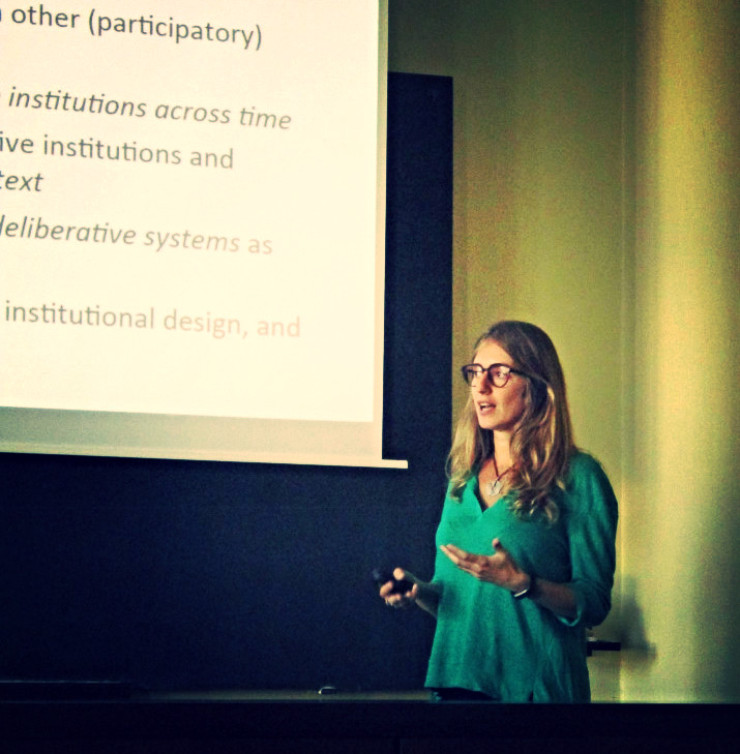News
-
September News
What's new @LATINNO? Summer 2016 came to an end and the LATINNO project is starting the fall season with some exciting new endeavors. Although we had to say goodbye to some of our excellent trainees after they finished their internship with us, we are welcoming new and very motivated collaborators to the team. Our data collection is constantly growing, and we are now advancing into 3 of the last 5 remaining countries: Guatemala, Nicaragua and Panama. We're also revising and updating the data on the first 15 countries we've coded to fill in some missing values - it's not easy to find the information we need to code all 42 variables for each case! Meanwhile, the case descriptions are being prepared to go online in the coming months. This means translating each of our current 1901 cases to all three languages of our website: English, Spanish and Portuguese. It's a lot of work, but we love doing it and look forward to sharing it with you!
> Read more -

New results from the LATINNO database presented at the APSA and ECPR annual conferences
In September, freshly released data and results from LATINNO's database were presented at the annual meeting of the American Political Science Association (APSA), in Philadelphia, and at the annual conference of the European Consortium for Political Research (ECPR), in Prague. At the 2016 ECPR General Conference, held from 7 - 10 September, LATINNO Coordinator Thamy Pogrebinschi chaired the panel "Democratic Innovations in Latin America: Beyond the Participatory Budgeting", in which she presented new information and data added to the LATINNO database. Her paper "Comparing Deliberative Systems: An Assessment of 12 Countries in Latin America" proposes a comparative approach to deliberative democracy and a theoretical framework to assess how deliberative systems operate at the country and cross-country levels. The paper can be downloaded from the APSA and ECPR websites.
> Read more -
Database Progress in August
After a long process of data collection, our database contains 1696 democratic innovations from 16 countries. Our quantitative and qualitative analysis includes the coding of 42 variables regarding the context, the institutional design, and the impact of each democratic innovation.
> Read more -
See what happened in July in LATINNO
LATINNO is more than a research project. One of our major goals is bringing together the academia and the policy practice to learn from each other. We seek to promote the exchange of information and knowledge on democratic innovations, and spur the debate on how new forms of citizen participation might improve democracy in Latin America and elsewhere. To this end, LATINNO contributes to both fields by participating in international conferences and events, publishing policy briefs and academic papers, and making data available. Here’s a summary of what happened at LATINNO in July.
> Read more -
Featured Case from Uruguay: "Por Mi Barrio"
“For my neighborhood” (Por Mi Barrio) is an online geolocation platform that allows the citizens of Montevideo to pin on a map any tangible and concrete problem related to urban public services, such as broken streetlights, potholes, and littering. The user can make the claims via smartphone or a computer by simply identifying the problem in a location according to predefined categories and with the option of adding a commentary and/or a picture.
> Read more -
“Alerta Democrática” in Latin America: democracy in transformation?
What is the future of democracy in Latin America? Is it in transformation, in tension, in mobilization or in agony? Alerta Democrática, a project from Open Society Foundations, and Ford Foundation, presents four possible scenarios based on a holistic approach for reflection and action.
> Read more -
LATINNO under discussion at the World Congress of Political Science
Prof. Thamy Pogrebinschi, coordinator of the LATINNO project, presents today some initial results based on LATINNO's database at the 24th World Congress of Political Science, celebrated in Poznan (Poland). The research offers some insights on how institutional design features of democratic innovations are bound to have an impact on different dimensions of the quality of democracy.
> Read more -
LATINNO goes to class: Democratic Innovations in Latin America in dialogue at Humboldt University
During last summer semester, LATINNO’s coordinator Thamy Pogrebinschi offered a seminar at the Institute of Social Sciences at Humboldt University in Berlin that focused on Democracy and Participation in Latin America. Throughout 12 weeks, students coming from diverse disciplinary fields such as Political Science, Sociology, Cultural and Latin American Studies discussed the historical and political context after the transition of Latin American democracies, focusing on their current situation and specificities.
> Read more -
Democratic Innovations in Latin America. A Story, a Project, Many New Ideas
Mariano Valentini interviews Thamy Pogrebinschi on the origins, development and first results of LATINNO. During the conversation, relevant topics, such as the role of digital tools in Latin American democratic processes and the future of political parties in light of the advance of democratic innovations, are further discussed.
> Read more -
LATINNO joins Liquid Democracy's summer party in Berlin
Have you ever heard of "Liquid Democracy"? What if we participated in political decisions by digital means? The think&do-tank at Liquid Democracy in Berlin has pioneered the development of a new digital participatory decision-making platform, Adhocracy: an open-source software providing citizens with civic participation tools.
> Read more
